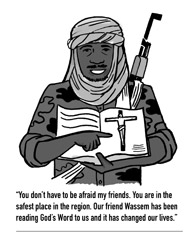Fortunately, they were less than three kilometers from a small African village where there was a Christian colleague, Waseem, whom Ahmed had trained in making disciples. Unfortunately, they knew that it would take a minimum of three days for a truck to arrive with the spare parts they needed. So Ahmed and Mechela left the vehicle and walked the remaining distance to Waseem’s home.
That evening, after milking his cows, Waseem invited the two men to join him for his Discovery Bible Study. Ahmed and Mechela readily agreed, picturing a short walk to a peaceful round hut with thatched roof, owned by a quiet family in the village. Waseem smiled innocently, then led his friends on a long, arduous trek under the desert stars. After several hours, Ahmed saw a large hut in the distance. It was indeed round with a thatched roof, and things were certainly quiet, but perhaps too quiet. The three men entered the hut and Ahmed stopped dead in his tracks.
Huddled inside was a group of some thirty men. All were dressed in desert camouflage, and all were heavily armed. Several of the men had automatic rifles in their hands or within reach. Most had ammo belts draped across a shoulder, and all had unwelcoming eyes focused toward the strangers. Ahmed recognized the men as a group of rebels, whom the Western press would term “freedom fighters,” but whom most Africans know as dangerous brigands. Had Ahmed known in advance that these men would be here, he would never have agreed to come. But Waseem simply beamed his smile once more, then sat down next to the rebel leader, who pulled out a Bible and opened it!
 “You have heard that it was said,” the rebel leader read, “'An eye for an eye and a tooth for a tooth.' But I tell you not to resist an evil person. But whoever slaps you on your right cheek, turn the other to him also. If anyone wants to sue you and take away your tunic, let him have your cloak also. And whoever compels you to go one mile, go with him two. Give to him who asks you, and from him who wants to borrow from you do not turn away.” Then the leader asked, “What did Isa say here, in your own words?”
“You have heard that it was said,” the rebel leader read, “'An eye for an eye and a tooth for a tooth.' But I tell you not to resist an evil person. But whoever slaps you on your right cheek, turn the other to him also. If anyone wants to sue you and take away your tunic, let him have your cloak also. And whoever compels you to go one mile, go with him two. Give to him who asks you, and from him who wants to borrow from you do not turn away.” Then the leader asked, “What did Isa say here, in your own words?”For the next hour, the thirty men discussed the words of Jesus, considering His commands that were so radically opposed to their own traditions, and wrestling with their conviction that they must begin to obey them. Ahmed and Mechela sat silently in a corner, gazing with amazement as many of the men, including the leader himself, wept openly over their sinful condition, These rebels, and many others like them, cloaked their crimes under the guise of fighting for independence, but they supported their “initiatives” by old-fashioned highway robbery. Indeed, these were the very types of men that Ahmed had feared when he passed the elderly hitchhikers some weeks earlier, knowing that they habitually hijacked cars and trucks in the desert, frequently murdering the passengers under the old adage “dead men tell no tales.”
The rebel leader blinked through his tears at Ahmed, then started to laugh. “You don’t have to be afraid, my friends,” he said, gesturing toward the fearful countenances of the two church planters. “You are in the safest place in the region!” The entire band broke into laughter as Waseem translated, many nodding in agreement as they hefted their loaded weapons. Ahmed smiled politely, but his eyes measured the distance to the door.
“My brother,” the rebel leader said in a serious tone, “our friend [pointing to Waseem] has been reading God’s Word to us, and it has changed our lives,” He glanced around the hut at his comrades. “We have been changed. We used to do all the stealing and… and other things… but now, now we are children of God!” As Waseem translated these words, a few men at the rear of the group scowled and exchanged glances, but many others nodded with smiles or tears; a few cried “praise God!” in their native tongue. Many of the rebels had already given their lives to Christ, and the group had slowly been diminishing as, one by one, the new believers returned to their homes to share the Word of God with their families. Some were still hardened in their ways of wickedness, but God had not finished yet. It was for that very reason that the leader himself yet remained, working to obey God’s commands by urging his men to continue following him into eternal life through Jesus Christ.
The next morning, the rebel leader sent several men with donkeys to tow the Land Cruiser back to the rebel hideout. “It will be quite safe here,” he joked. Ahmed and Mechela remained with the band for several days, until the spare parts arrived, and in spending time with these men, whom they had once feared, their understanding of God’s Word was transformed.
“These men were my brothers,” Ahmed explained later.
(excerpted from Jerry Trousdale, Simple Churches: Dramatic Transformations, Rapid Replication, Mission Frontiers, Sep/Oct 2012)
(To receive new uMarko posts via a daily email, please click Subscribe)


No comments:
Post a Comment